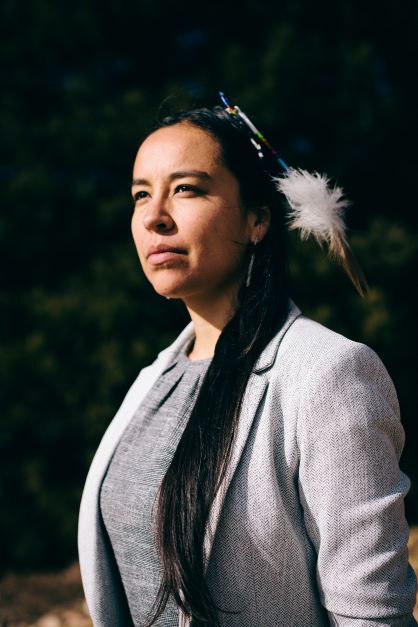Campus News
Indigenous land management focus of this year’s Conversations on Climate Justice
Wildfires. Flooding. Drought. The nation has faced these climate issues for centuries. Yet, there’s still a lot that can be learned from pre-colonial indigenous food and land management techniques to combat our current climate problems, according to Dr. Lyla June Johnston, the keynote speaker for UC Santa Cruz’s third annual Conversations on Climate Justice event, coming up this Monday, March 13.



Wildfires. Flooding. Drought. The nation has faced these climate issues for centuries.
Yet, there’s still a lot that can be learned from pre-colonial Indigenous food and land management techniques to combat our current climate problems, according to Dr. Lyla June Johnston, the keynote speaker for UC Santa Cruz’s third annual Conversations on Climate Justice event, coming up this Monday, March 13.
Johnston, who is known in the music world as Lyla June, is an Indigenous musician, scholar, and community organizer of Diné (Navajo), Tsétsêhéstâhese (Cheyenne), and European lineages. The focus of her upcoming discussion, “Architects of Abundance: Indigenous Regenerative Food Systems and the Excavation of Hidden History,” is centered on the findings from Johnston’s Ph.D. dissertation exploring how Indigenous Americans gardened the land on bio-regional scales to produce abundant food systems. Her research was also the focus of a September 2022 TedX talk.
“This has been talked about for 500 years, but the majority of Americans are woefully uneducated on Indigenous land management,” said Johnston, who holds a bachelor’s degree in Human Ecology from Stanford University, a master’s degree from the University of New Mexico in American Indian Education, and a Ph.D. from the University of Alaska, Fairbanks, with a focus on Indigenous Pedagogy. “It’s not about farming or the national park system. It’s the ways in which native people cultivated the natural food-bearing capacity of the land through controlled burns, floodplain management, soil management, and habitat expansion of key plants and animals.”
Through Johnston’s unique brand of storytelling that combines her lived experience, visuals and music, she will present an “ocean of solutions that these civilizations have had for today’s failing systems.”
The hybrid event, presented in person at the Merrill Cultural Center and virtually on Zoom from 5-7 p.m. March 13, is co-sponsored by UC Santa Cruz’s Institute for Social Transformation, the American Indian Resource Center, and the People of Color Sustainability Collective. The event is also made possible by financial support from the Kamieniecki Lecture Fund Endowment.
Valentin Lopez, chairman of the Amah Mutsun Tribal Band, will be providing remarks in context to our local region. The Amah Mutsun Tribal Band are descendants of the Indigenous people taken to Mission Santa Cruz and San Juan Bautista during the brutal colonization of this area. Chairman Lopez is looking forward to sharing Indigenous knowledge and areas of primary concern regarding climate change with the campus community.
“My hope is that people will recognize the value of the Indigenous perspective with regard to addressing climate change, and take the time to talk more about traditional ways to address these issues,” said Lopez.
Brook M. Thompson, a Ph.D. candidate in environmental studies, will speak at the event about how Indigenous knowledge can be better implemented into California water policy.
Representatives from the People of Color Sustainability Collective, a collaboration between the Ethnic Resource Centers, College Nine, John R. Lewis College, and the UCSC Sustainability Office that focuses on environmental justice topics through the lens of “inclusive sustainability,” believe that students will find a lot of value in the upcoming event.
“Power is in this deep mentorship and connectivity at these events and the joy in this new wave of environmentalism,” said Maya Caminada, a senior Anthropology major and a PoCSC intern. “We want to bring more of this as action and movement.”
To learn more or register in person or virtually, visit the Conversations for Climate Justice event page on the Institute for Social Transformation’s website.